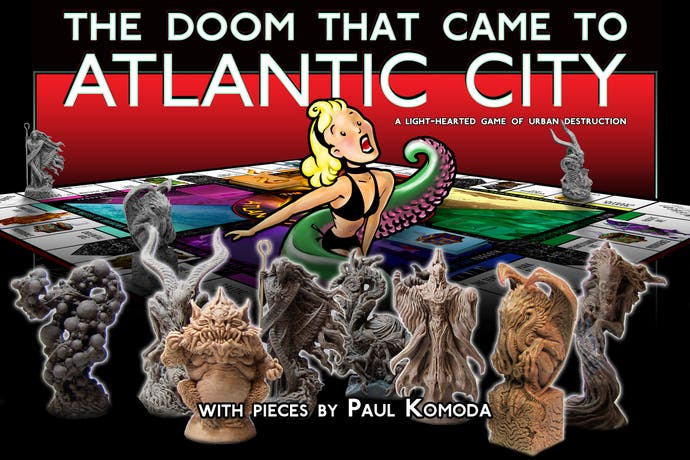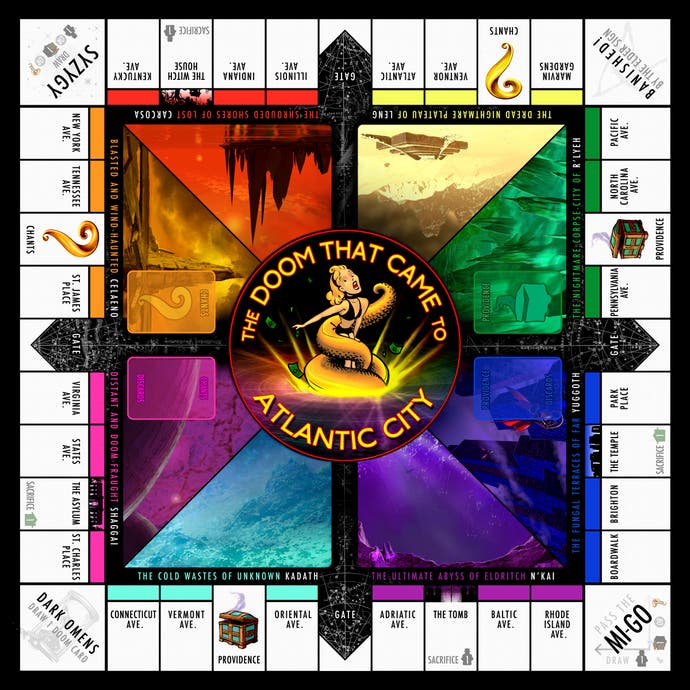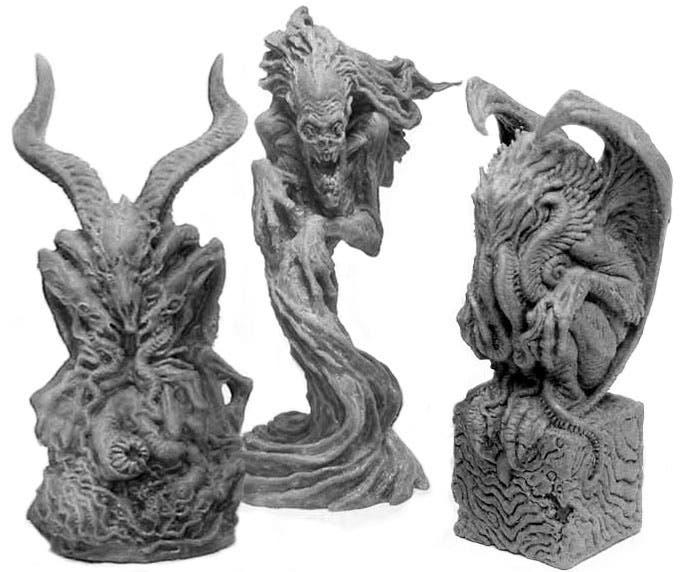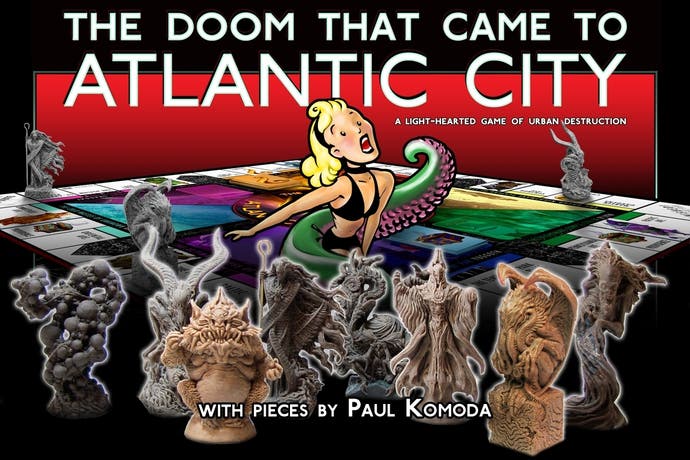Kickstarter game raises $123K, then gets canned after 13 months
Creator promises eventual full refunds, but I wouldn't hold my breath.
Last spring a board game entitled The Doom That Came to Atlantic City drew a lot of attention on Kickstarter. $122,874 worth of attention, to be precise. Not too shabby for a developer only looking for $35K. Unfortunately, 13 months later, the project has been cancelled as the developer, The Forking Path, ran out of money.
"The project is over, the game is canceled," wrote the project lead Erik Chevalier in a Kickstarter update. "Every possible mistake was made, some due to my inexperience in board game publishing, others due to ego conflicts, legal issues and technical complications. No matter the cause though these could all have been avoided by someone more experienced and I apparently was not that person."

So where did the money all go? That's still a bit of a mystery, but Chevalier said, "after paying to form the company, for the miniature statues, moving back to Portland [Oregon], getting software licenses and hiring artists to do things like rule book design and art conforming the money was approaching a point of no return."
Look, I know Portland is the greatest city in the world and everything, but some might argue that that's not really what the Kickstarter backers were paying for. Chevalier later added in an update today that this move was actually a business decision based on Portland's lower cost of living. "The move back to Portland from California was multi-pronged, but mainly in order to work in a less expensive and more supportive community that I felt would benefit the company, and by extension its customers, in time," he explained.
"I've spent a large amount of time pitching investors, begging banks for loans and seeking other sources of funding to fix this." -Eric Chevalier
"I've spent a large amount of time pitching investors, begging banks for loans and seeking other sources of funding to fix this," he pleaded. "Sadly I found no takers."
Chevalier deflected his colleagues from the backlash by stating "Lee [Moyer, artist] and Keith [Baker, game designer] were not directly involved in this decision," and "Keith has only ever done amazing work in getting this made and can't be blamed in any way for its downfall."
Unsurprisingly, Baker agreed with Chevalier's notion that he wasn't at fault. In a guest post on Geekosystem Baker wrote, "I would like to make one thing crystal clear. Lee Moyer and Keith Baker are not part of the Forking Path. Neither one of us received any of the funds raised by the Kickstarter or presales. I haven't received any form of payment for this game. Lee and I were not involved in the decisions that brought about the end of this project, and we were misinformed about its progress and the state of the game."

Strangely, Baker seems as confused as everyone with what Chevalier did with the money. "When Lee and I first heard this news from Erik, it came as a shock," Baker lamented. "We've been working on this game for over a decade... Based on the information we'd been receiving from the Forking Path we believed that the game was in production. It's a personal and financial blow to both of us, but what concerns Lee and I is that people who believed in our work and put their faith in this Kickstarter have been let down."
"Lee and I don't know exactly how the money was spent, why the backers were misled, what challenges were faced or what drove the decisions that led to the cancellation of the game." -Keith Baker
"Lee and I don't know exactly how the money was spent, why the backers were misled, what challenges were faced or what drove the decisions that led to the cancellation of the game," Baker added. "Not only did we not make any money from the game, we have actually lost money; as soon as we learned the true state of affairs, we engaged a lawyer to compel The Forking Path to come forward to the backers and to honour its pledge to issue refunds.
Since the production of The Doom That Came to Atlantic City went belly-up, Baker and Moyer will continue to make a print-and-play version of the game. "You'll have to use your own cardstock and paper, and we can't produce the amazing miniatures sculpted by Paul Komoda. But we can share our ideas and our work, and we hope that you will enjoy it."
Baker concluded, "It's not what we expected or planned on, but we at least hope that you will finally be able to get some enjoyment from the game we've worked on for all these years."
Understandably, there was a lot of backlash aimed at Chevalier, who updated the Kickstarter today to clarify some things, but he noted "There are things you don't know and I can't talk about yet without first seeking legal advice, but hopefully in time everything will be made clear." He said that he'd spoken to the Oregon Department of Justice and it sounded like he was off the hook for fraud. "While they gave no promises their agent didn't feel that I'd committed any fraud. I am going to provide them with more information and work with them to see what I need to do to make this right in their eyes."
"By canceling the game I returned all rights to the title, art and sculptures to their creators. This prevents me from producing any products, free or sold, related to the property." -Eric Chevalier
Unlike other Kickstarters that fall short at the 11th hour and just need that extra push of capital, Chevalier has claimed that he can't complete the project due to legal reasons. "By canceling the game I returned all rights to the title, art and sculptures to their creators. This prevents me from producing any products, free or sold, related to the property. This means that I cannot distribute any type of print and play editions or related merchandise such as miniatures."

Chevalier promised to "eventually refund everyone fully," but one wonders if and when that will happen. "I've publicly promised to repay EVERY backer because that is my obligation per the Kickstarter Terms of Service. I am contractually bound to do that much and I absolutely intend to," he stated before noting that he has already begun the refund process. Of course, this could take awhile, so I wouldn't hold my breath. Digging the hole deeper for the indebted developer, Kickstarter and Amazon take fees off pledges. "Even if this project had folded on day one, before I'd spent a single cent of the funding, I would NOT have been able to immediately refund everyone due to the 10 per cent fees that Kickstarter and Amazon took off the top."
Responding to threats of legal action, Chevalier took the "you can't draw blood from a stone" approach and claimed that this would only ruin him further and decrease anyone's chance of seeing a return on their investment. "If I were to immediately pay back as many of you as I could right this moment a sizable percentage would go unrefunded which would only cause more problems," he said. "If I'm dragged into court then everything will vanish into legal fees and I'll never be able to refund anyone else. If a little more patience is dredged up from the depths and I'm given time to work and refill the coffers I can eventually, with some hard work and dedication, refund everyone."
This isn't the first time a fully-funded game Kickstarter has failed. We saw this last year with Haunts, which ran out of money and fell behind schedule as members of its studio got jobs elsewhere. However, that game only raised about a quarter of what this did, and it's still in development - albeit a prolonged one. Plus the project lead was so open about his development troubles that only three people asked for refunds the first day of its hiatus and many supporters are currently offering their know how to help see the project to fruition.
I've contacted Chevalier about this kerfuffle and am awaiting reply. He's stated that he's working on a detailed post-mortem on what went wrong - and how he didn't simply take the money and run - so hopefully that will clear up a lot of questions. Based on backer comments, it seems like people are less hung up on getting refunds than they are on why the project failed in the first place.

